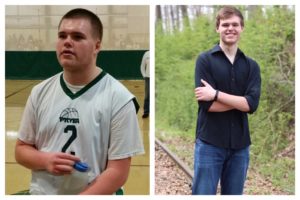Nurture better than nature
Adopted children go through experiences that differ from other children
Photo via Pixabay under Creative Commons license
A family with two children all hold hands. Some children do not have the experience of being in a family before they are adopted, causing them to see the world in a different way.
March 21, 2018
It is a noble thing to adopt children and give them the opportunity to live a life like other children and be taken care of. However, it must be taken into account that adopted children will go through different experiences than children who aren’t, especially if they were beyond infant amnesia.
Adoption is a concept of assuming parenthood or guardianship of a child and calling him or her one’s own.
Sophomore Sarah Aves* is an example of an adopted child who was beyond toddler age when she met her adoptive family. She has been adopted for five years, along with her biological brother. According to Aves, she had seen more struggles and hardships by the age of five than most people. She has valid reasons for stating this.
Her biological grandfather separated her and her brother from her biological parents, and they were placed in an orphanage for most of their lives. “[I don’t keep in touch with my old orphanage] because I have not had good memories there,” Aves said. She declined to describe her experiences in the orphanage. She confirmed that she misses the feeling of having a family like other kids have had their entire life.
Sophomore Lena Protsay* was adopted three years ago, and, unlike Aves, she still keeps in touch with her old orphanage. “My mother died, and there was no one there to take care for me, so I lived on my own for a while,” Protsay said. Now she lives with her adoptive family and sister. “When I first met them, I thought they were nice, but now I can see that they’re quite strict,” Protsay said. Nevertheless, she appreciates her foster family and the love that she has been receiving from them, though they are not her biological family.
Protsay’s sister, Sonya Zubko*, has been living with her adoptive family for a year. She was taken from her biological family due to their struggles with alcoholism. “In Ukraine, [families] cannot keep their children when they are alcoholic [sic],” Zubko said. Due to this, she was put into foster care. “I was very angry with my mother, and hurt as well,” Zubko said. After her great-grandmother and foster guardian died, she was put into an orphanage, through which she was later adopted.
Children who are adopted from birth or a relatively younger age have not experienced the lack of a family and the love that accompanies it, but they do experience identity crises, especially when they were adopted internationally. Sheyann Barger, a writer for Adoption.com, believes that adopted children undergo a crisis that children who live with their biological parents do not experience. For example, adopted children may feel disconnected from their adoptive parents due to the lack of shared attributes and things in common with them. This problem makes it difficult for adopted children to discover their identity.
Sophomore Alice Baker* has experienced this identity crisis first hand. “I regret not knowing how to speak Chinese, even though I was born there,” Baker said. She also admitted to finding it difficult to figure out where exactly she belonged. “I am an American from China, yet there’s nothing related to the Chinese culture around me,” she said. She noticed her differences when she went to learn Chinese and found herself among five year-old children while not understanding anything. “It was a class for children who already knew the basics of the Chinese language,” Baker said.
Every story of an adopted child is different and discusses a new experience, although it may not appear to do so. Their life stories will be different from other families that have not gone through the obstacles that come with being adopted and lacking a true family. However, adopted kids are grateful to their adopted families who gave them a chance to live at least a portion of their childhood like other kids.
Sophomore Ashley Banks* was adopted as a baby and does not remember being in an orphanage. “I probably had to be adopted due to the one child law in China,” Banks said. With this knowledge, there are many other kids that are victims of this law and currently preside in orphanages. “Some kids in my orphanage may never get adopted, and thrown out when they become eighteen. Being adopted has given me a chance that other kids do not get, which I am thankful for,” Baker said.
*Names of students changed in accordance with guidelines from the Federal Educational Rights and Privacy Act which “generally prohibits the improper disclosure of personally identifiable information derived from education records.”









Sweeny • Mar 24, 2018 at 6:26 pm
Very well written and kudos to the children who came forward and agreed to share their story.
Melissa Hoffman • Mar 24, 2018 at 10:04 am
Adoption is second life. The people who cannot have children, adoption provide the opportunity to enjoy parenthood. For children it provides opportunity to live in the family unit. Very emotional article. I had strong sense of deja vu after reading the article.
Julia • Mar 23, 2018 at 11:07 am
This is very well written, and we have a lot to learn, it’s clear
A Arora • Mar 23, 2018 at 1:36 am
This is one of the very unique article. Reading the kids experience provide me mixed feelings of both sadness and happiness. The adaptation must be hard for both the parent and the child.
Supriya • Mar 22, 2018 at 7:36 am
This is very emotional area to write. In my opinion, the kids adopted as babies vs older kids may have very different experience. I am curious to know is it better idea to let adopted kids know that they are adopted or keep silence.